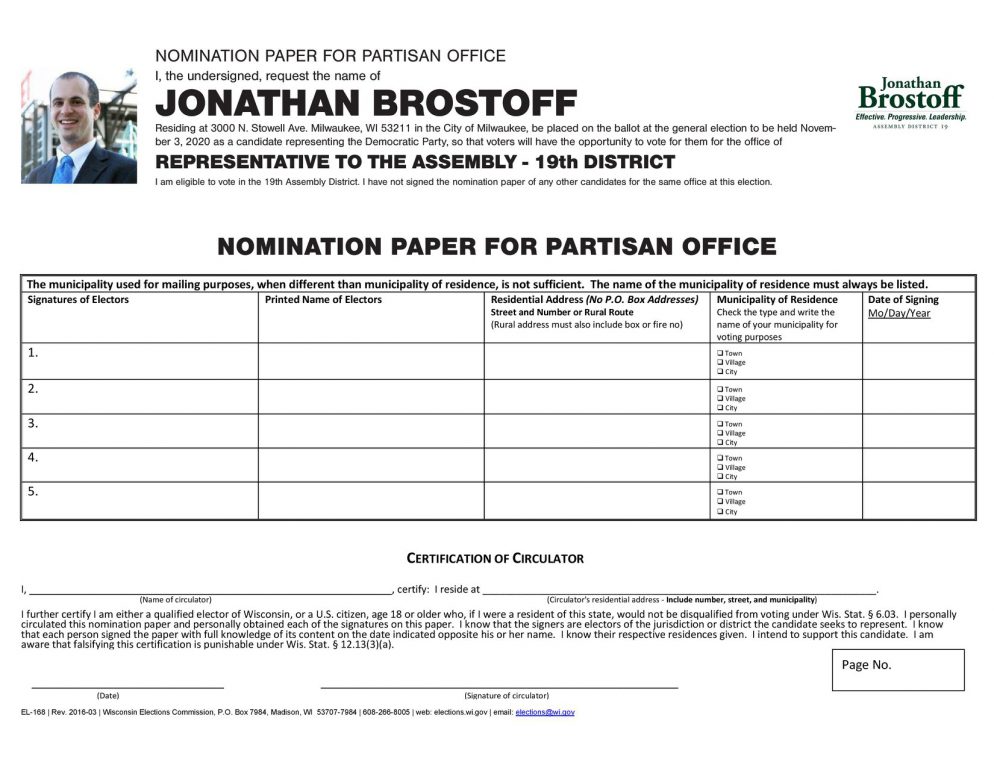Politicians Need Virus-Weary Voters’ Signatures
How can candidates get nomination papers signed and maintain social distance?
If you thought the safety-versus-voting controversy that raged before and after the April 7 election is over, think again.
Candidates running for Congress and the Legislature now need thousands of signatures on their nomination papers. Candidates must turn those signatures and other forms into Wisconsin Elections Commission (WEC) officials in Madison by 5 p.m. June 1.
How have candidates traditionally collected those signatures? They’ve gone door-to-door, or greeted their neighbors at social and public events, asking them to sign their nomination papers. It’s been an informal, quick social transaction, but it violates all “Safer at Home” and “6-feet apart” edicts of federal and state governments.
Candidates have also had family members, their supporters and for-profit companies collect signatures on their behalf. But, whether it’s the candidate or a temp getting $1 per signature, it’s been an in-your-face interaction. “Circulators” who ask for the signatures must date the document and affirm that qualified voters signed the forms..
State law requires the following numbers on nomination papers submitted by candidates for the Nov. 3 ballot, which will include the presidential election:
*At least 1,000 signatures of residents for each of Wisconsin’s eight seats in the U.S. House of Representatives.
*At least 400 signatures for each of the 17 state Senate seats up on Nov. 3.
*At least 200 signatures for each of the 99 Assembly seats up on Nov. 3.
Do the math: If 20 candidates run for U.S. House seats, they will need to collect at least 20,000 signatures. If 30 candidates run for the state Senate, they must submit 12,000 signatures. If 150 candidates run for the Assembly, they must submit 30,000 signatures. Those numbers total 62,000 signatures, which must be gathered statewide.
How do you collect signatures on nomination papers in the shadow of a “Safer at Home,” Covid-19 contagion?
WEC officials say they don’t have the power to lower or waive the required number of signatures on nomination papers, which are set by state law. So far, there’s been no sign that Democratic Gov. Tony Evers or Republicans who control the Legislature plan to rewrite election laws, despite Democrats’ calls for mailing absentee ballots to every registered voter.
Last week, WEC Administrator Meagan Wolfe offered this advice on obtaining signatures to potential Nov. 3 candidates:
“[T]he Commission reaffirms the use of ‘single signed and circulated’ nomination papers to limit the amount of in-person/face-to-face contact that normally occurs during the circulation of nomination papers.”
Wolfe’s advisory defined a ”single signed and circulated” nomination paper as a “document provided by a candidate to individual supporters” that is downloaded from a Website or sent by email or by the Postal Service.
Then, Wolfe added, “The supporter completes the signature line of the page with the required information (printed name, signature, address and date of signing) and then also completes the certification of circulator as the individual who presented the paper for signing. Once the individual has completed the certification … they then provide the nomination paper back to the campaign via mail or hand delivery.”
But that’s a cumbersome and confusing process. It also relies on the same U.S. Postal Service that can’t explain why many absentee ballots for the April 7 election were not delivered to voters or not returned to local election clerks in time to be counted. Wisconsin’s U.S. senators want an investigation of that lapse.
Charles Franklin, veteran Marquette University Law School professor and pollster, said requiring candidates to ask neighbors to sign their nominating petitions has been a “contact sport” that “seems unwise during a pandemic.”
The exercise is a “gatekeeping function for ballot access,” Franklin said. It requires would-be candidates “to demonstrate a minimal level of support and avoid potentially large numbers of names on primary ballots.”
But, Franklin added: “If social distancing remains in effect, or simply something people continue to practice, some alternative to signature collection might be in order.”
Steven Walters is a senior producer for the nonprofit public affairs channel WisconsinEye. Contact him at stevenscotwalters@gmail.com
More about the Coronavirus Pandemic
- Governors Tony Evers, JB Pritzker, Tim Walz, and Gretchen Whitmer Issue a Joint Statement Concerning Reports that Donald Trump Gave Russian Dictator Putin American COVID-19 Supplies - Gov. Tony Evers - Oct 11th, 2024
- MHD Release: Milwaukee Health Department Launches COVID-19 Wastewater Testing Dashboard - City of Milwaukee Health Department - Jan 23rd, 2024
- Milwaukee County Announces New Policies Related to COVID-19 Pandemic - David Crowley - May 9th, 2023
- DHS Details End of Emergency COVID-19 Response - Wisconsin Department of Health Services - Apr 26th, 2023
- Milwaukee Health Department Announces Upcoming Changes to COVID-19 Services - City of Milwaukee Health Department - Mar 17th, 2023
- Fitzgerald Applauds Passage of COVID-19 Origin Act - U.S. Rep. Scott Fitzgerald - Mar 10th, 2023
- DHS Expands Free COVID-19 Testing Program - Wisconsin Department of Health Services - Feb 10th, 2023
- MKE County: COVID-19 Hospitalizations Rising - Graham Kilmer - Jan 16th, 2023
- Not Enough Getting Bivalent Booster Shots, State Health Officials Warn - Gaby Vinick - Dec 26th, 2022
- Nearly All Wisconsinites Age 6 Months and Older Now Eligible for Updated COVID-19 Vaccine - Wisconsin Department of Health Services - Dec 15th, 2022
Read more about Coronavirus Pandemic here
The State of Politics
-
A Wisconsin Political Trivia Quiz
 Dec 15th, 2025 by Steven Walters
Dec 15th, 2025 by Steven Walters
-
The Fight Over Wisconsin’s House Districts
 Dec 8th, 2025 by Steven Walters
Dec 8th, 2025 by Steven Walters
-
The Battle Over On-Line Betting
 Nov 24th, 2025 by Steven Walters
Nov 24th, 2025 by Steven Walters






















